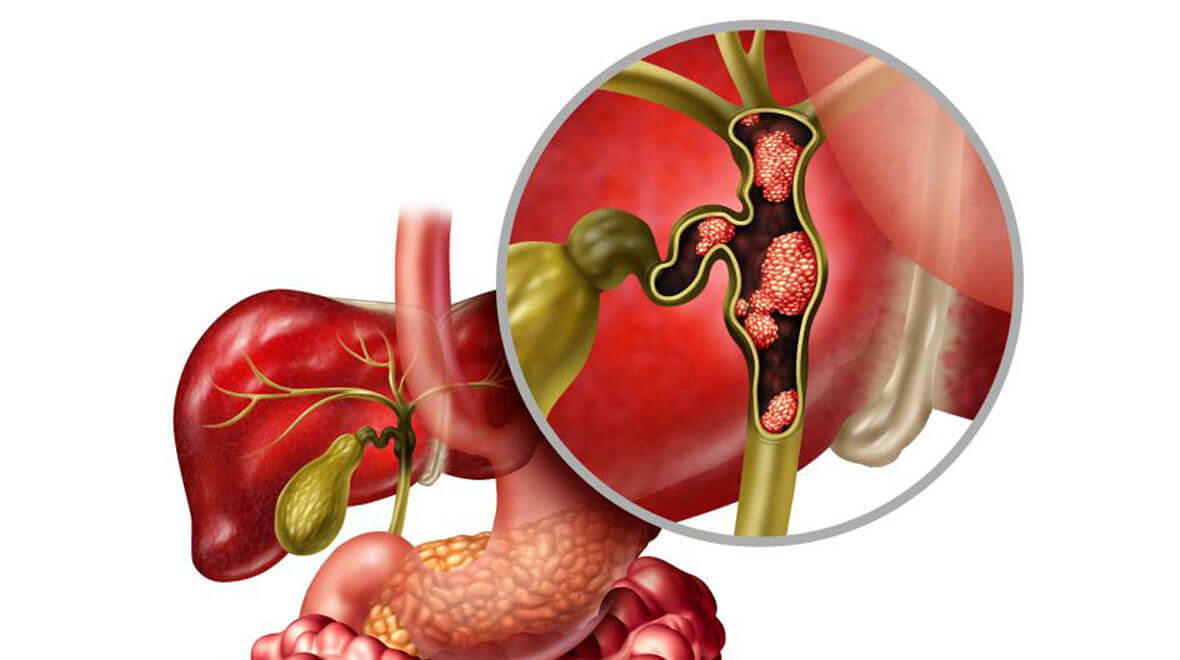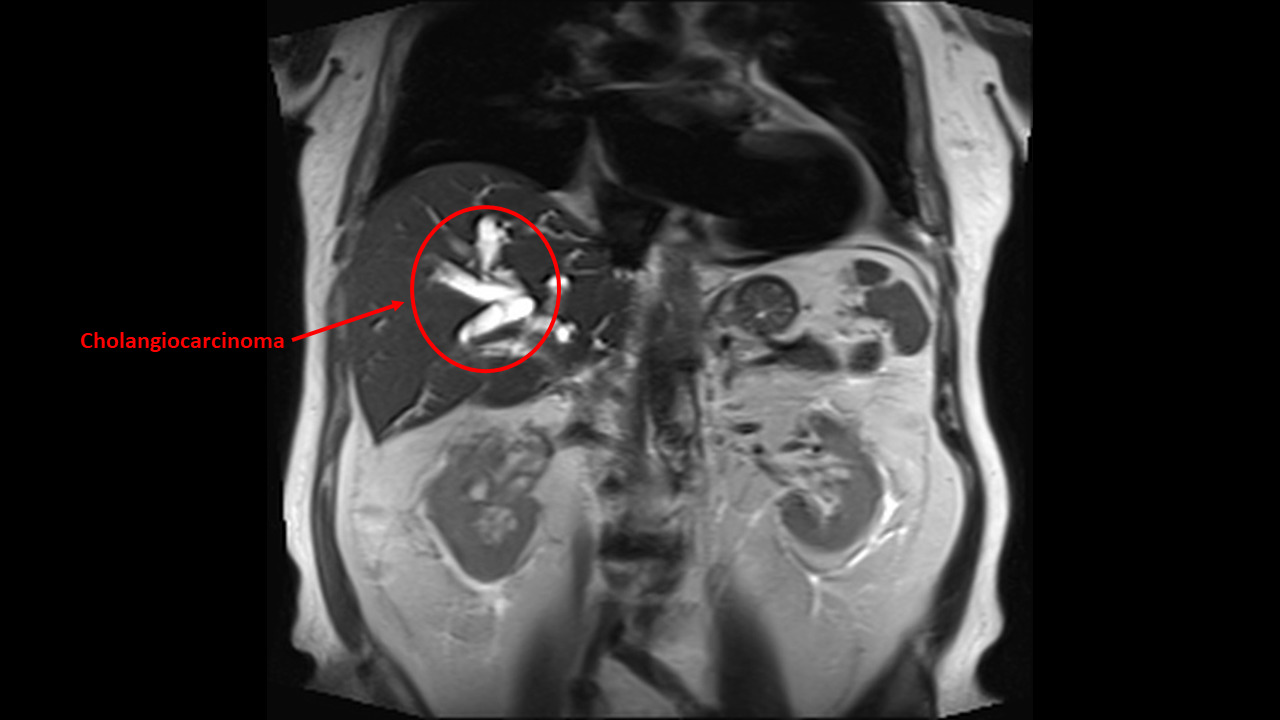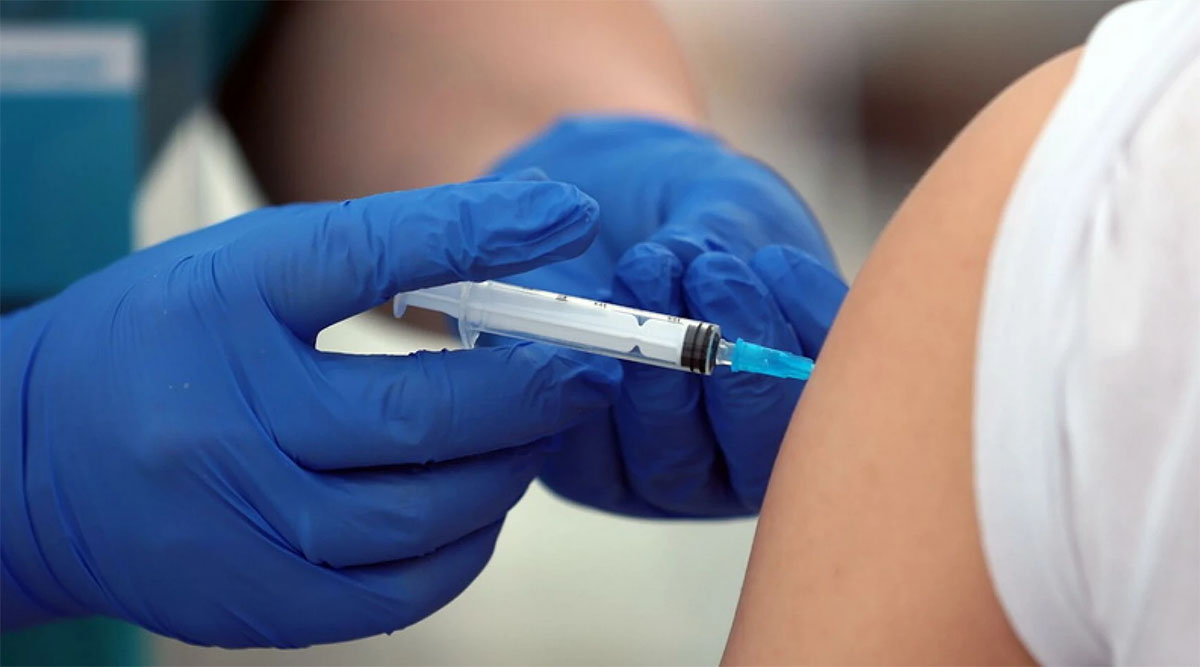Calls for Ukraine
Calls for Europe
Calls for USA

Cholangiocarcinoma (cholangiocellular carcinoma, cholangiocellular cancer) is a malignant disease of the biliary tract, in which the tumor arises from the epithelial cells of the bile ducts. This is a fairly rare pathology; the proportion of cholangiocarcinomas among all malignant tumors of the gastrointestinal tract is approximately 3%. Most often, this neoplasm is found in patients over the age of 50 years. Cholangiocarcinoma is diagnosed in men 1.5 times more often than in women.
Cholangiocarcinoma is a fairly serious disease, the treatment of which is complicated by the fact that the disease is usually detected in late stages. However, a personalized approach to therapy and the use of the most advanced treatment methods make it possible to effectively combat the disease even in the most complex and advanced cases.
The exact causes leading to the occurrence of liver cholangiocarcinoma have not been determined. Factors that may contribute to the development of cholangiocarcinoma include:

In the early stages, the pathology develops asymptomatically, especially when it comes to the intrahepatic form. Over time, when the tumor leads to disruption of the outflow of bile, symptoms characteristic of cholangiocarcinoma appear:
If the development of cholangiocarcinoma is complicated by the development of infectious processes, an increase in body temperature may be observed.
Doctors distinguish three types of cholangiocarcinoma depending on the location of the tumor:
As the tumor develops, it can spread beyond the bile ducts and metastasize. The malignant process may involve the liver, lymph nodes, and blood vessels. Of the removed organs, the lungs are most often affected. In rare cases, bone metastasis is possible.

Doctors use a comprehensive examination to diagnose cholangiocarcinoma. The disease is usually first diagnosed by ultrasound. Further testing usually includes a CT scan or MRI, which can show the exact size and location of the tumor and determine whether the portal vein and hepatic artery are involved. In advanced clinics involved in the diagnosis and treatment of this disease, magnetic resonance cholangiopancreatography (MRCP) is also performed, with which you can get the most complete picture of the condition and see how large blood vessels are involved in the process.
A biopsy is required to make a definitive diagnosis. This is a procedure during which a small area of tumor tissue is removed for analysis. Such manipulation can be performed percutaneously or, if the location of the tumor does not allow this, during laparoscopic surgery. The resulting samples are then examined in laboratory conditions.
Modern methods of diagnosing cancer also include genetic testing. Its use makes it possible to detect hereditary or acquired mutations in genes that are associated with cancer. Also, studies of this kind can detect cancer markers, which makes it possible to personalize treatment and select the most effective drugs.
The average five-year survival rate for cholangiocarcinoma is 20-30% if the pathology is detected in the early stages. The later the pathology is detected, the more difficult it is to treat and, accordingly, the lower the five-year survival rates. However, it is important to understand that life expectancy depends on the characteristics of the patient’s condition, the characteristics of the pathology, and how correctly the treatment is selected.

Oncologists use different treatment methods for this disease, the selection of which depends on the age and health parameters of the patient, the location of the tumor, its histological characteristics, the presence of metastases and other features. Doctors may use the following methods:
Complete removal of cholangiocarcinoma is the most preferred treatment option. However, in the early stages the disease is detected quite rarely, and in the later stages of development, it is often impossible to completely remove the tumor.
For this pathology, different types of operations can be used:
In addition, surgical palliative care can be used in later stages of the disease:
Doctors may prescribe chemotherapy to shrink tumors before surgery or as palliative therapy for inoperable tumors. The drugs can be administered intravenously or locally into the tumor. Hyperthermic intraperitoneal chemotherapy (HIPEC) has recently been frequently used as a second option. During surgery, high concentrations of chemotherapy drugs heated to 41-42℃ are injected into the tumor area. This option makes it possible to use large doses of drugs and thereby achieve better results.
In recent years, targeted drugs have been used to treat malignant diseases, which act more specifically on malignant cells. Genetic diagnostics makes it possible to personalize the treatment of hepatocellular cancer and select drugs taking into account mutations in genes. Typically, targeted therapy for this disease uses tumor growth inhibitors, which prevent the appearance of blood vessels that supply the tumor with blood.
Radiotherapy may be given before or after surgery. Modern radiological installations make it possible to precisely target a tumor with minimal impact on healthy tissue.
Doctors also use brachytherapy. In this case, local irradiation is performed, since the radioactive substance is placed directly next to the tumor.
Oncologists can use radiosurgical treatment using the CyberKnife system if the tumor is detected in the early stages.
This is a fairly new technique that is used for inoperable forms of the disease. First, a special substance is introduced into the body, which accumulates in the tumor. Then the neoplasm is exposed to a laser and the tissue with a large amount of the injected substance is destroyed. The use of photodynamic therapy makes it possible to reduce symptoms and alleviate the general condition.

The action of immunotherapy is aimed at activating the body’s immune system to fight a malignant disease. For this purpose, special drugs are being developed that can be effective against different types of tumors. One of the promising areas of immunotherapy is the use of antitumor vaccines. The MedTour platform cooperates with laboratories and clinics that develop and use cancer vaccines in the treatment of cancer. They are produced using different technologies, but they always help the body resist cancer.
Antitumor autovaccine is developed individually for each patient. It is created from the patient’s own tumor cells, so it is usually performed after surgery. The use of such a vaccine makes it possible to improve the results of other types of treatment and avoid the occurrence of relapses and metastases. Another vaccine option is a xenovaccine, which is made using animal germ proteins that are very similar to tumor proteins. After their modification, a drug is created that can also be used to prevent relapses of many types of cancer.
For more information on cancer vaccines and their application options, please contact us.
Prognosis for diagnosing cholangiocarcinoma will depend on the individual characteristics of the patient’s condition and on the methods that will be chosen as treatment. You can take advantage of all the possibilities of modern medicine if you contact the best clinics and consult with good specialists who use the latest techniques and innovative treatment approaches. Then the likelihood of successful treatment will increase and the prognosis will noticeably improve.
You have the opportunity to make a comprehensive diagnosis and undergo treatment in the best clinics for the treatment of cholangiocarcinoma. You can go to the most advanced medical centers that treat this disease, located in different countries. For example, to the Teknon clinic in Barcelona, which is awarded the “Best Clinics in the World 2021” sign, or to the Liv Hospital clinic in Turkey, where the most advanced cancer treatment methods are used.
On the MedTour platform you can get acquainted with the leading clinics in this profile and choose the most suitable option for you. The MedTour coordinator will help you make the right choice. During a free consultation, our employee will tell you about the clinics and the medical opportunities they offer.
MedTour will help you find a good specialist for the treatment of cholangiocellular cancer. We collaborate with the best oncologists specializing in this type of tumor. By contacting the MedTour coordinator, you can get detailed information about doctors dealing with pathologies of this type in different countries. Our staff will help you choose the doctor who best suits your medical needs and personal requirements.
Please rate the work of MedTour
